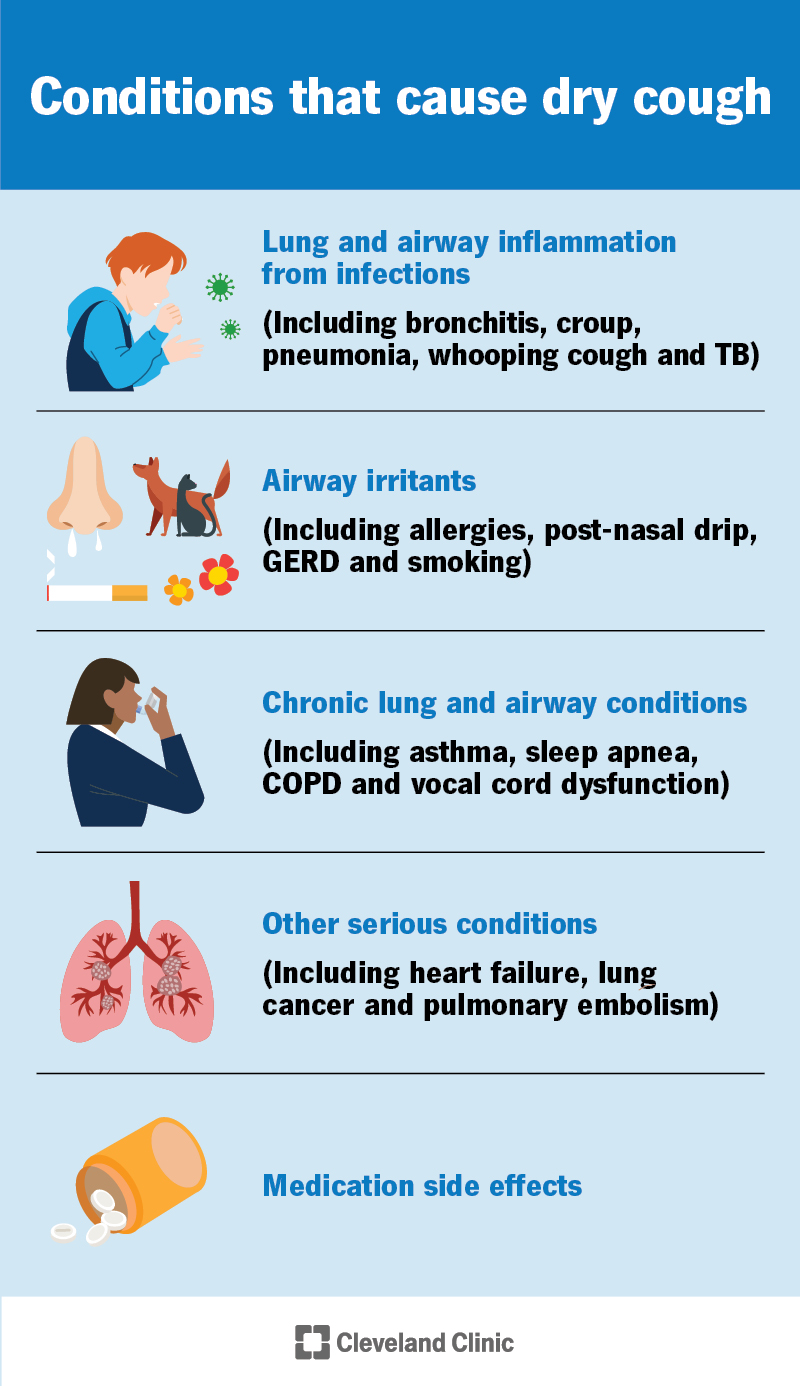A dry cough is a cough that doesn’t produce mucus. When your airways or lungs are inflamed, a tickly, irritated feeling causes you to cough. If you don’t have mucus (usually produced when you have an infection), it will be a dry, unproductive cough. Common causes include allergies, asthma, acid reflux and bronchitis.
Advertisement
Cleveland Clinic is a non-profit academic medical center. Advertising on our site helps support our mission. We do not endorse non-Cleveland Clinic products or services. Policy

Image content: This image is available to view online.
View image online (https://my.clevelandclinic.org/-/scassets/images/org/health/articles/dry-cough)
A dry cough is a tickly irritation in your airways or throat that doesn’t bring up any phlegm or mucus when you cough. Because there isn’t mucus blocking your lungs or airways, nothing comes out when you cough. A dry cough is also called an unproductive cough.
Advertisement
Cleveland Clinic is a non-profit academic medical center. Advertising on our site helps support our mission. We do not endorse non-Cleveland Clinic products or services. Policy
A cough is your body’s way of clearing your lungs and airways of irritants and foreign matter that can make you sick (like viruses and bacteria). You usually get a dry cough when your airways are inflamed or something irritates them. You usually get a wet cough when you have an infection that’s creating a lot of mucus to try to clear out the cause of the infection.
Sometimes, it can come with other symptoms of a respiratory infection, or with chest tightness from coughing too much.
Conditions that cause dry coughs include:
Some more serious conditions can cause a chronic dry cough, including:
COVID often causes a dry cough because of how much it inflames and irritates your lungs and airways. But it can also cause a wet cough for some people.
Advertisement
Colds and flu tend to cause wet, productive coughs when you’re sick. Later, a dry cough may linger — sometimes for weeks — while you recover.
Most dry coughs clear up when you treat the underlying cause. Your provider may get a chest X-ray and listen to your heart and lungs to help determine (or rule out) the cause.
To treat a cough at home that’s caused by allergies, previous infections or less serious causes, you can try:
Most medicines for cough aren’t approved for kids under 4. Running a humidifier and sitting in the bathroom with a hot shower going can help. Ask your child’s pediatrician how to treat a dry cough.
You can lower your chances of getting a dry cough by:
You should call your healthcare provider if you experience serious symptoms, like:
If you have a dry cough that lasts longer than three weeks — especially if you’re not sure of the cause — contact a healthcare provider. They can help you get to the bottom of whatever’s causing it and might be able to give you some symptom relief.
Rarely, a dry cough indicates a serious, potentially life-threatening health problem. You should see your healthcare provider if you have concerns about a cough.
Many people have a feeling of chest tightness with a dry cough. If you have a forceful cough or one that lasts longer than three weeks (chronic cough), it can strain your lungs or chest muscles. You may develop chest pain from coughing. It might feel like pressure (like there’s a weight on your chest) or a squeezing sensation.
Advertisement
If your chest muscles hurt from coughing, over-the-counter pain relievers like acetaminophen (Tylenol®) or ibuprofen (Advil®, Motrin®) might help.
Seek immediate care if you have sudden, unexplained chest pain. It can be a sign of a heart attack.
Dry cough — a tickly, irritating feeling that doesn’t bring up any mucus — can range from annoying to downright painful. It can be frustrating to find the cause and get relief. Fortunately, most causes of dry cough aren’t serious. At-home remedies and OTC medications can sometimes help your cough feel better until you can treat the cause. See a healthcare provider any time you have a lingering, unexplained cough.
Advertisement

Sign up for our Health Essentials emails for expert guidance on nutrition, fitness, sleep, skin care and more.
Learn more about the Health Library and our editorial process.
Cleveland Clinic’s health articles are based on evidence-backed information and review by medical professionals to ensure accuracy, reliability and up-to-date clinical standards.
Cleveland Clinic’s health articles are based on evidence-backed information and review by medical professionals to ensure accuracy, reliability and up-to-date clinical standards.
Cleveland Clinic’s primary care providers offer lifelong medical care. From sinus infections and high blood pressure to preventive screening, we’re here for you.
